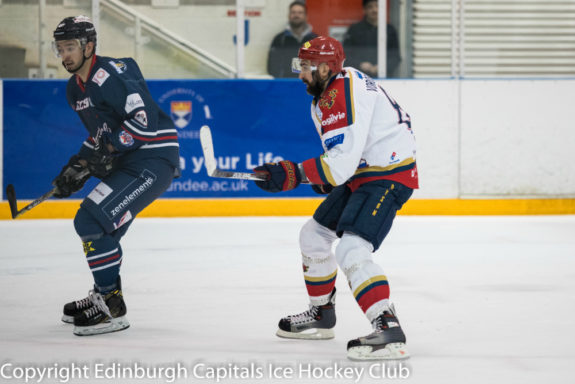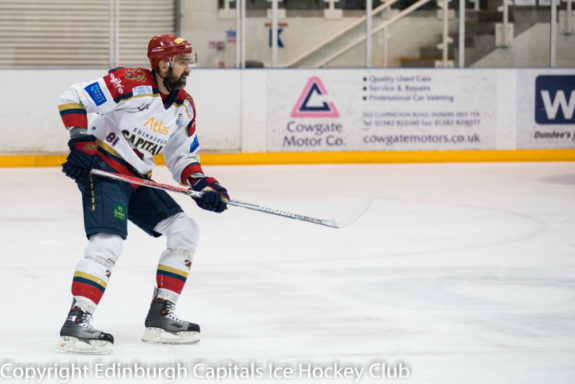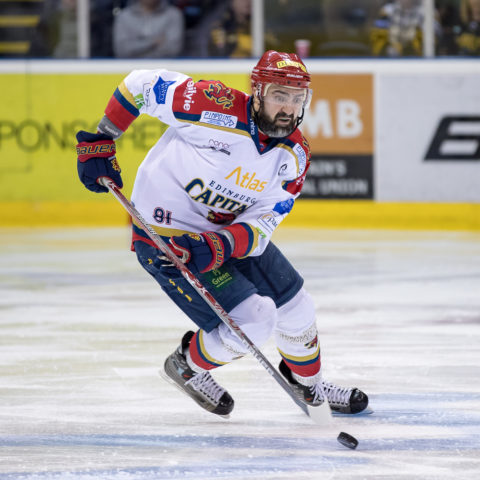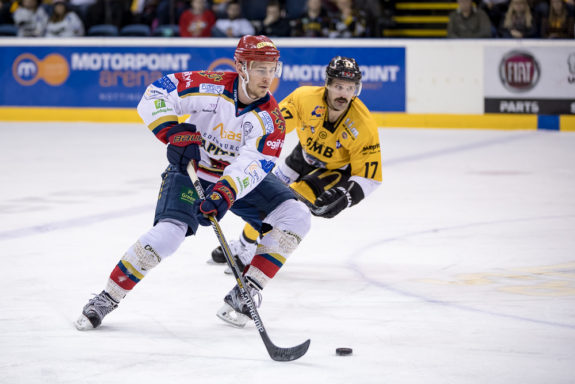After spending a good part of his career at home in Russia, former Chicago Blackhawks forward Pavel Vorobyev decided to try to breathe some fresh air and last year moved to the UK top league, the EIHL, to sign a contract with the Edinburgh Capitals.
One year later, after a very good season, the forward renewed his deal with the Scotland-based franchise for a further season. The Capitals have strengthened the team for the upcoming 2017-18 campaign, acquiring some interesting off-ice assets like the new head coach Dmitri Khristich and advisors like former NHL players Andrei Nikolishin and Darius Kasparaitis.

In this translated interview, originally appearing on the Russian website Sport-Express, the veteran talked about his move to Edinburgh, life in the EIHL, and much more.
Moving to Edinburgh
* You can enjoy the original article in the Russian language by Alexei Shevchenko here *
Alexei Shevchenko: You spent the last season in Edinburgh. I’m sure that no other Russian can boast about having played in Scotland. But tell me, when do you think that we’ll have the first British player in the KHL?
Pavel Vorobyev: I don’t think that there is a player who can play in the KHL right now. In the Vyschaya Liga then it’s possible, but for now not at a higher level. We, of course, know the history of players coming from non-traditional countries, like Anze Kopitar from Slovenia. However, today I don’t see that a British player can be the same. In general, everything is just at the beginning. Maybe not from scratch, but right now it’s at an embryonal state.
AS: Can you give me an example?
PV: I’d have a lot of them. Once we’d go to a city, and a group of children were practicing there, the coach was wearing a helmet with a full mask. I was wondering if he was scared. And another thing, our arena features stone boards.
AS: In what sense?
PV: In a direct sense. From the outer side, they look like normal plastic boards, but they are brick walls! I told them to buy iron skates because any normal skate would just fall apart if hitting such a board. Generally speaking, it’s very painful to hit them.

AS: I had a look at the Edinburgh roster. Of course, I know you and Evgeny Fedorov. We’ll talk about the Canadian foreigners later. But I am not sure I ever heard any of the Scottish players.
PV: Do you know that next year our coach will be Dmitri Khristich? It won’t be easy for him. The fact is that many British players are just semi-pro. When there are no games, they have a regular job. And, for example, they don’t attend daytime practices. Probably this is why we don’t have many skating practices.
AS: What are their jobs?
PV: The best-paying job in Scotland is the renovation of apartments and offices. Most likely because it’s a pay-by-hour job. For the whole day, they’d paint walls, glue wallpaper and they’d play hockey on nights. I can’t wait until we’ll get to work with Khristich. He’ll surely give the players more workloads, but on the other hand, it’s hard to ask a lot from guys who work all those hours on their job. From time to time, the club invited Latvian defenseman Rihards Grigors, but he wouldn’t always play, and the times he did not, then he’d work at a store, where products get packed.
AS: Even the Canadian imports don’t look like high-level players.
PV: I am the player with the most NHL experience with 50 games. Then there is Jared Staal with two games. I had a look at my teammates’ profile, many of them played college hockey, and then played some ECHL. Someone managed to play a bit in the AHL too.
AS: They still manage to get signed.
PV: In the EIHL, each team can dress up to 14 foreign players. A big part of those imports is made up of Canadians. These Canadians are everywhere, just have a look at the rosters of other European clubs. Every team wants to sign Canadian players because they are the main trendsetters in our hockey world.

AS: And why not Russian players? Many of them who play in the VHL would be most likely pretty good.
PV: I also wonder the same. I try to talk about it with agents and staffers. Some say that Russian players are unreliable as they can start drinking.
AS: It can’t be true!
PV: Yes. Canadian players do more of a show. They play in a more entertaining way, even if maybe it’s not the most beautiful. About Russian people they say that there are too many problems. The club admitted that they were taking a risk by offering me a contract. But after the season, they realized that I wouldn’t let them down.
Life in the EIHL
AS: You were your team’s top scorer. How many times were you awarded with the best player of the game honors?
PV: Some ten times, maybe more. Our main star was our goalie (NOTE: Travis Fullertun). We were often losing with huge scores, but he would do 40-50 saves each game. After the season he moved to the Dundee Stars.
AS: I was told that the EIHL can’t really compete with other pro leagues regarding the salaries.
PV: It’s true. I made 2,000 GBP a month. The salaries here range 1,300-3,000 GBP a month. The League’s highest paid player was Brian McGrattan of the Nottingham Panthers.
AS: Six thousand GBP per month?
PV: It was rumored that he was making 2,000 GBP a week.
AS: Today you need 73 rubles for one Pound, but anyway I think that living in the UK is expensive.
PV: Yes, it’s incredibly expensive. But it also depends on how you look at it. There are stores who sell expensive products, but their quality is also high. You have the choice. If you cook at home and don’t go too often to restaurants, then you’ll have no problems. At least, it’s better than the VHL. I and Evgeny Fedorov were given an apartment and a car, but with the flat it didn’t go well.
AS: In what sense?
PV: In other clubs, the team pays the bills, while we had to do it ourselves. The bills are very high in Scotland. Maybe next year it will be different.
Vorobyev confirmed Capitals return
? https://t.co/HFkiQBskgO pic.twitter.com/qDhIvYn8Zx— EIHL (@officialEIHL) June 12, 2017
AS: How professional is the Edinburgh Capitals team?
PV: It’s one of the poorest clubs in the EIHL, and it shows in many aspects. For example, I mentioned earlier about the skating sessions on game days. Nottingham or Cardiff have such sessions, but we did not. It was bad, especially during away games. For example, we’d get out of the hotel at 12, without having an organized meal, and you had to kill five or six hours before the game. Sometimes, however, you have a chance to sleep or rest on the bus. We aren’t a rich club, but now the team is getting helped by Russian investors and probably the situation will change.
AS: It is rumored that a team from Great Britain will play in the KHL. How realistic is this?
PV: Not now. Teams owners are billionaires, but they aren’t too much into hockey. All the hope is in Russian investors, who will explain to them that investing in hockey is a good thing. But it’s just talking right now.
AS: I can’t imagine a UK-based team to have away games in Khabarovsk, Vladivostok and Beijing.
PV: And then, back at home, they’ll face SKA and CSKA. Yes, it would be a huge problem for them. Most often after the games, we just get home and sleep at our place. But this is just one of the hard parts.
AS: What kind of arenas do UK teams control?
PV: There are great arenas, like in Nottingham or in Belfast. And there are other arenas that are objectively worse, like our arena in Edinburgh.
AS: Like Spartak Moscow’s Sokolniki?
PV: Worse, much worse. Another thing that really amazed me in Scotland is the lack of any advertising of hockey games. I had the impression that no one knew that the team even existed. And this is considering that we had our fans, who travelled with us during away trips. I want to thank them, they aren’t a lot of people, but they supported us in a great way during the away games, especially me. Thank you a lot!

AS: The EIHL features teams from England, North Ireland, Scotland and Wales. Did you have any trouble with the fans?
PV: No, why? Maybe it’s just in soccer that it’s like that. Not at hockey games. Fans do support their team, they yell, and sing, but without aggression. There is such a tradition that after each game our team salutes the crowd. This is a good thing.
AS: How did you get to such a non-traditional country for hockey?
PV: You won’t believe it, but through [Russia most popular social network] VK. I always wanted to play abroad, but I didn’t have any offer. My colleague Artyom Tomilin then wrote an agent, who offered him to play abroad. Artyom told me, and so I created a profile there and started writing to that guy, and thus I ended up in Great Britain.
AS: Weren’t you worried?
PV: Not really. I like living abroad. I know many guys who prefer to stay at home in Russia, but I’m feeling great in Europe. I’m very happy to be living in Scotland now.